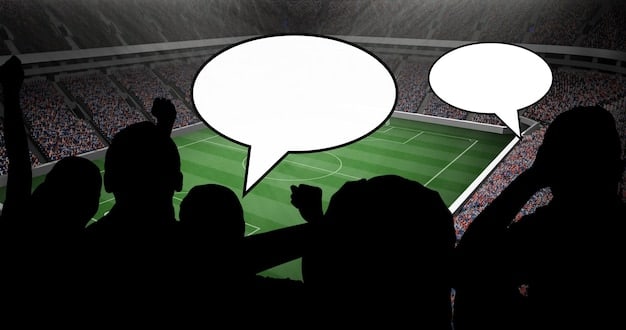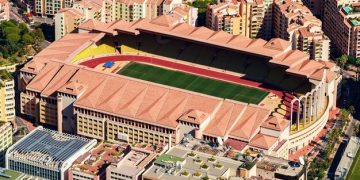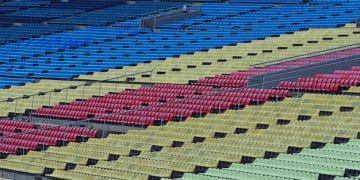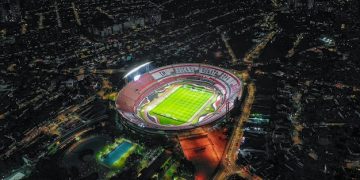La Liga Refereeing: Controversies, Key Decisions & Consequences

La Liga’s refereeing controversies often spark heated debates, significantly impacting match outcomes and league standings due to pivotal decisions that face intense scrutiny from fans, players, and the media.
La Liga, Spain’s top professional football league, is renowned for its passionate fans, world-class players, and high-stakes matches. However, alongside the beautiful game, controversies surrounding refereeing decisions frequently surface. These La Liga’s refereeing controversies: Analyzing key decisions and their consequences can alter match results, influence league standings, and ignite fierce debates among fans, players, and pundits alike.
Understanding the Role of Referees in La Liga
Referees play a crucial role in ensuring fair play and upholding the rules of the game in La Liga. Their decisions can heavily influence the outcome of matches, making them central figures in the sport. A deep understanding of their responsibilities and how they operate within the context of La Liga is essential to analyzing the controversies surrounding them.
The Responsibilities of a La Liga Referee
A La Liga referee’s duties extend beyond simply enforcing the laws of the game. They involve managing player behavior, ensuring the safety of all participants, and making split-second judgments that can significantly affect the flow and outcome of a match.
- Enforcing the Laws of the Game: Referees are responsible for applying FIFA’s Laws of the Game, making sure players adhere to the rules.
- Managing Player Conduct: They must manage player behavior, issuing warnings (yellow cards) and expulsions (red cards) when necessary to maintain discipline.
- Ensuring Player Safety: Referees have a duty to protect players from dangerous tackles and unsporting conduct, prioritizing their well-being.
- Making Critical Decisions: They make critical decisions on fouls, penalties, offsides, and other match-defining events, often under intense pressure.
Accurate and consistent refereeing is crucial for maintaining the integrity of La Liga. When referees make errors or inconsistent calls, it can lead to frustration, controversy, and the perception of unfairness among teams and fans.
Common Types of Refereeing Controversies in La Liga
Refereeing controversies in La Liga come in various forms, each capable of sparking intense debate and impacting match outcomes. These issues often revolve around subjective interpretations of the rules, leading to disputes and accusations of bias.
Penalty Decisions
Penalty decisions are a frequent source of controversy. The determination of whether a foul warrants a penalty kick is often subjective, leading to differing opinions among fans, players, and pundits. Incorrect or missed penalty calls can significantly alter the course of a match.
Offside Calls
Offside calls, particularly those that are marginal, can also generate controversy. With the speed of modern football, assistant referees must make split-second decisions, and slight misjudgments can lead to goals being wrongly disallowed or allowed.
Red Card Incidents
Red card incidents, where players are ejected from the game, are another common source of contention. The severity of a foul and the intent of the player are often debated, with differing opinions on whether a red card was justified.

Referees face immense pressure to make accurate calls in real-time, and these decisions can have significant repercussions. Understanding the various types of refereeing controversies helps in analyzing their impact on La Liga.
The Impact of VAR on Refereeing in La Liga
The introduction of the Video Assistant Referee (VAR) system in La Liga was intended to reduce errors and increase the accuracy of refereeing decisions. However, VAR itself has become a source of controversy, with debates over its implementation, consistency, and impact on the flow of the game.
How VAR Works in La Liga
VAR involves a team of referees who review key match incidents, such as goals, penalty decisions, red card incidents, and cases of mistaken identity. They can advise the on-field referee to review their decision on a monitor or overturn it altogether.
VAR Controversies and Criticisms
Despite its aim to improve accuracy, VAR has faced numerous criticisms. These include:
- Inconsistent Application: Critics argue that VAR is not applied consistently across different matches and incidents, leading to frustration and confusion.
- Subjective Interpretation: VAR decisions often involve subjective interpretations of the rules, resulting in differing opinions on whether the “clear and obvious error” threshold has been met.
- Disruption to the Flow of the Game: VAR reviews can take several minutes, disrupting the flow of the game and diminishing the spontaneity of celebrations.
While VAR has undoubtedly corrected some incorrect decisions, it has also introduced new controversies and debates, raising questions about its overall effectiveness.
Analyzing Specific Controversial Decisions
Examining specific controversial decisions in La Liga provides insight into the challenges referees face and the impact their calls have on match outcomes. Several high-profile incidents have sparked widespread debate and scrutiny.
Real Madrid vs. Barcelona: A Case Study
Matches between Real Madrid and Barcelona, known as El Clásico, are often rife with controversial refereeing decisions. One particular incident involved a disputed penalty call in favor of Real Madrid, which Barcelona players vehemently protested.
Atlético Madrid vs. Sevilla: A Disallowed Goal
Another incident involved a disallowed goal in a match between Atlético Madrid and Sevilla. The referee ruled that a player was offside in the build-up, but replays suggested the decision was marginal, leading to outrage from Atlético Madrid.

Analyzing these specific controversial decisions underscores the importance of accurate and consistent refereeing in La Liga, as well as the need for transparency and accountability.
The Role of Media and Fan Reactions
The media and fan reactions play a significant role in shaping the narrative around La Liga refereeing controversies. Media outlets often dissect controversial decisions, amplifying the debate and putting pressure on referees. Fan reactions, both online and in stadiums, can also influence perceptions and create a hostile environment.
Media Coverage and Analysis
Media coverage of refereeing controversies tends to intensify the scrutiny on referees, with pundits offering their opinions and dissecting decisions frame-by-frame. This constant analysis can heighten tensions and make it more difficult for referees to make impartial decisions.
Fan Reactions and Social Media
Fan reactions, particularly on social media, often reflect strong emotions and biases. Fans may accuse referees of bias towards certain teams or players, leading to targeted harassment and abuse. Social media platforms provide a space for these opinions to be amplified and spread rapidly.
The intense media and fan scrutiny surrounding La Liga refereeing controversies highlight the need for fair and balanced coverage, as well as responsible behavior from fans both online and in stadiums.
Potential Solutions and Improvements
Addressing La Liga refereeing controversies requires a multi-faceted approach, involving improvements to referee training, technology, and communication. Implementing effective solutions can help reduce errors, increase transparency, and restore confidence in the integrity of the game.
Investing in Referee Training
Investing in comprehensive referee training programs is essential. These programs should focus on improving decision-making skills, enhancing knowledge of the laws of the game, and developing effective communication strategies.
Enhancing VAR Technology and Implementation
Improving VAR technology and its implementation can help reduce errors and inconsistencies. This includes refining the protocols for VAR reviews, ensuring consistent application across all matches, and providing clearer communication to fans and viewers.
Promoting Transparency and Communication
Promoting transparency and communication between referees, teams, and fans can help build trust and understanding. This includes providing explanations for key decisions, publishing post-match reports, and engaging with fans through social media and other channels.
| Key Point | Brief Description |
|---|---|
| ⚽ Impact of Penalties | Penalty decisions often spark debate and greatly affect match outcomes. |
| 🚩 Offside Controversies | Marginal offside calls can wrongly disallow or allow goals, leading to disputes. |
| 📺 VAR’s Role | VAR aims to correct errors but faces criticism for inconsistency and disruption. |
| 📢 Media Influence | Media amplifies refereeing debates, increasing pressure on officials. |
Frequently Asked Questions (FAQ)
▼
Refereeing decisions are often controversial due to the subjective nature of interpreting football rules, high stakes of matches, and intense scrutiny from media and fans.
▼
While VAR has corrected some errors, it has also introduced new controversies due to inconsistent application and subjective interpretations, leading to mixed opinions on its effectiveness.
▼
Common criticisms include inconsistent application, subjective interpretation of “clear and obvious error,” and disruption to the flow of the game due to lengthy reviews.
▼
Measures include investing in comprehensive referee training, refining VAR protocols, promoting transparency through explanations of key decisions, and fostering better communication with fans and teams.
▼
Media coverage amplifies controversies, increasing pressure on referees. Fan reactions on social media can create hostile environments and lead to harassment, influencing overall perceptions of fairness.
Conclusion
La Liga refereeing controversies are an integral part of the league’s narrative, characterized by passionate debates and significant impacts on match outcomes. By understanding the roles and responsibilities of referees, analyzing the types and effects of controversial decisions, and continually striving for improvements through comprehensive training, technology enhancements, and transparent communication, La Liga can work towards mitigating these controversies and maintaining the integrity of the game.





